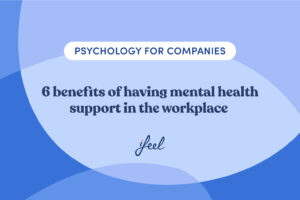Content
ToggleMental well-being during retirement is a key aspect for many and can produce a combination of feelings among individuals. Following years of dedicated work, saying goodbye to a lifelong career, and adjusting to a fresh daily routine represents a significant shift. Some eagerly anticipate this moment throughout their entire working life, envisioning the opportunity to dedicate their time to activities and loved ones. However, many individuals worry about retiring, as it marks the start of an unfamiliar phase where their sense of purpose may become elusive, potentially impacting their mental well-being.
How to prevent poor mental well-being during retirement
If a transition is unwanted, it naturally takes on a negative connotation. As we construct our careers, we also shape a professional identity closely tied to our jobs. Besides the crucial financial aspect, certain occupations ingrain employees with a sense of purpose and belonging, and losing this connection can instill fear in those facing retirement.

The retirement process is gradual, typically allowing employees to anticipate when they will retire, giving them time to prepare. This is where organisations play a pivotal role in facilitating the transition and supporting employees in retirement planning.
To begin with, companies should establish a comprehensive well-being solution that provides psychological support from the moment an employee joins the organisation. This early intervention is essential for maintaining employees’ mental well-being throughout their tenure with the company. The goal is to address any mental health issues and proactively prevent their emergence, leveraging the expertise of mental health professionals. Therefore, it is imperative for every company to prioritize raising awareness and understanding about retirement and its potential impact on mental health if they wish to ensure a seamless retirement experience for their employees.
How can we prevent poor mental well-being during retirement?
While the retirement journey may come with its share of highs and lows, there are certain strategies we can adopt to navigate it in a constructive manner. Here are some guidelines for safeguarding mental well-being during retirement:
1. Productivity
Engaging in hobbies and interests serves as a great way to maintain productivity. We must involve ourselves in activities that instill a sense of productivity, whether physical or mental stimulation. If you haven’t already found a hobby, consider exploring something new. This exploration could lead to acquiring fresh skills or joining clubs to forge new connections. Productivity can cultivate a profound sense of purpose and contentment. Furthermore, crafting a routine centered around these activities can contribute to upholding structure and stability in our lives.
2. Be socially active
Maintaining social connections in retirement is essential in combating the sensation of isolation. Whether it involves staying connected with friends and family (through in-person meetings, phone calls, or social media) or becoming a member of a club to foster new relationships, engaging in social interactions is instrumental in cultivating a sense of engagement and alleviating loneliness.
3. Bridge employment
In contrast to the conventional approach to retirement, the idea of bridge employment has gotten increasing attention in recent years. Bridge employment refers to retirees who choose to remain active by working on various projects even after formally retiring. This practice can offer significant advantages for one’s mental well-being during retirement, as it fosters a sense of fulfillment and productivity, particularly for those who find the traditional retirement transition challenging.
4. Invest in psychological support
Ideally, retirees should possess the essential resources for a healthy retirement, with organisations providing continuous mental health support throughout their employees’ journey. However, when this support is lacking, retirees should contemplate seeking therapy as a valuable resource to address issues that may impact their mental well-being.
Join the global leading solution in mental well-being
Obstacles faced by future retirees
Every employee addresses retirement differently, and while some eagerly anticipate it, it can occasionally trigger unexpected emotions. The transition period can evoke a range of feelings, potentially leading to a decline in mental well-being. Below, we outline several typical difficulties encountered by individuals amid their retirement journey:
1. Sense of purpose
Retirement marks a significant life transition, characterised by a substantial change in daily routines and a potential adverse impact on individuals’ mental health. For some, their very identities are closely intertwined with their professional roles, and the abrupt loss of this identity can create a profound sense of loss. This phenomenon is particularly common among those who must retire unexpectedly, as they often find themselves unprepared for this abrupt shift.
2. Loneliness
Loneliness is a significant hurdle encountered by individuals approaching retirement. The workplace inherently fosters social interactions and connections, making it challenging to say goodbye to the daily contact with colleagues with whom you share harmony. Confronting retirement in isolation and grappling with associated concerns can be intimidating, often resulting in depression, anxiety, and diminished self-esteem.
3. Financial stress
Financial stress stands as a primary concern impacting the mental well-being of retirees. This can affect individuals who lack the necessary resources for a comfortable retirement or have not received adequate guidance on post-retirement financial management. The burden and anxiety associated with financial uncertainty can, in turn, precipitate feelings of depression and anxiety.

Overcoming these obstacles can be challenging, particularly when confronting retirement in solitude. This underscores the importance of companies taking proactive measures to mitigate these challenges. Implementing comprehensive retirement planning and integrating mental health support within such programs is vital. This approach ensures employees are thoroughly equipped to navigate this significant life transition effectively.
Mental well-being in organisations
In conclusion, preventing poor mental well-being during retirement should be a company’s responsibility, as they are committed to taking care of their employees throughout their entire lifecycle at the company.
We partner with companies worldwide to inspire human growth and guide organisations in cultivating a positive mental well-being culture. A tailored and people-centric approach that places your employees’ health at the core, as a fundamental pillar in attracting and retaining talent as well as enhancing their sense of belonging.
A unique, comprehensive, and scalable solution that uses the power of data to provide a holistic understanding of your employees’ mental well-being, whilst ensuring service quality and confidentiality for your team.
We hope you found this post on mental well-being during retirement interesting. If you would like more information about ifeel’s employee well-being platform simply request it, and we will contact your team as soon as possible.













